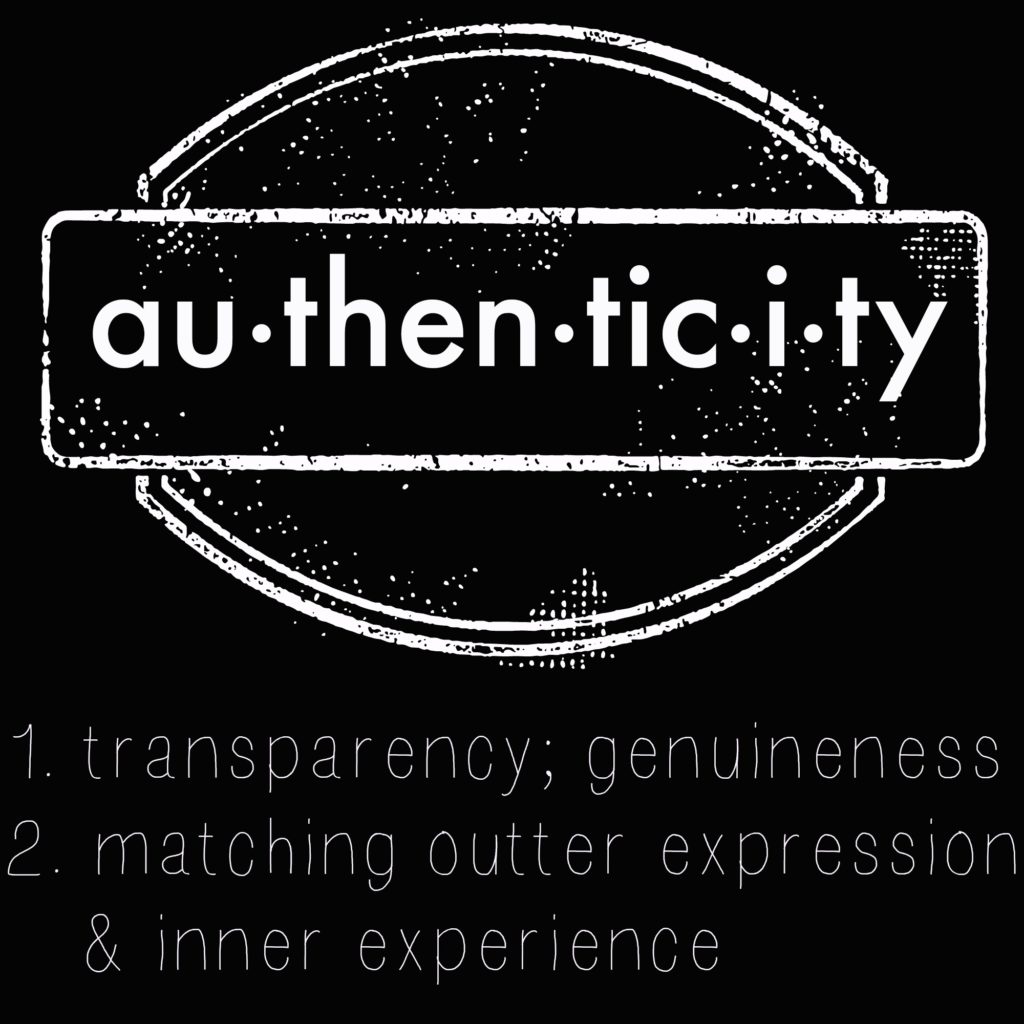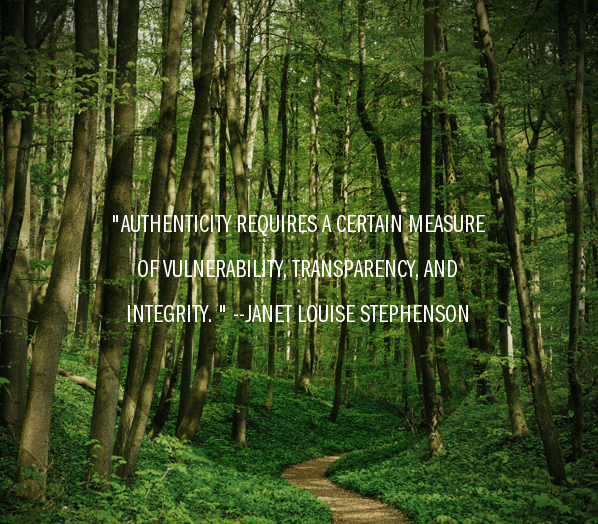In recent years, our culture seems to have become obsessed with the pursuit of authenticity. In a world that has grown increasingly fake, it’s a phenomenon that’s not too hard to understand. For years, we have been subjected to nearly toxic levels of superficiality, from not-quite-reality television, and magazine cover models that have been photoshopped beyond recognition, to Facebook feeds littered with the impossibly perfect family photos of our friends, acquaintances, and the occasional stranger. It’s no wonder that we have begun to crave a healthy dose of truth and transparency.
I have to admit that I personally find this trend rather refreshing. Like many millennials, I am uninterested in living out relationships that are based on superficialities and lies. I have grown to value authenticity and vulnerability in others, and have found that others appreciate – and even admire – these same traits in me. That being said, I have a confession to make: I still struggle with being totally authentic. The most obvious explanation for this is that I care too much about others’ opinions of me. I’m often told that insecurities fade with age, and while my own confidence has indeed improved with maturity, I continue to experience periodic self-consciousness, even at the *advanced* age of thirty. When these feelings of inadequacy bubble to the surface, I immediately revert to my mask of perfection, and authenticity is squelched.
There are other, more altruistic reasons for my failure to be authentic. Too often, I have seen the quest for transparency morph into a thinly veiled excuse for negativity and complaining. I sincerely want to avoid becoming the person who uses a stranger’s innocent “How are you?” as an invitation to elaborate on my grievances. The last thing I want in being vulnerable or authentic is to burden others with my problems, or to come across as attention-seeking or needy.
Another reason for my authenticity-avoidance is that I have found most people (myself included) to have a fairly low tolerance for complete, undiluted transparency. We commend others for opening up about their perceived inadequacies, and are happy to let them share their struggles or fears for a time. But when their story fails to come wrapped up with a pretty bow, we grow weary of their vulnerability. I’ve often seen this with people who are experiencing a personal tragedy, such as the loss of a child. At first, we encourage the mourner to share about her grief. We affirm her experience and even applaud her willingness to mourn openly. But time passes. . . enough time, that we feel she should be over her loss and ready to move on. We grow weary of her candid expressions of grief. Our impatience is in no way justified, but it is our reality.
This low tolerance threshold for others’ pain leads me to wonder whether we value authenticity for its own sake, or simply because it makes us feel better about ourselves. We appreciate when a home blogger reveals pictures of her piles of laundry because it validates the imperfections in our own households. We commend an actress for opening up about her weight struggles because it helps us to feel better about our own bodies. But when someone shares – repeatedly – about a deeper struggle or insecurity, this transparency shifts from being self-affirming to being uncomfortable and inconvenient, leading our declared desire for transparency to evaporate.
So how do we reconcile all of these shortcomings with our longing for authenticity? In my own life, I have found that my (flawed) solution is to be completely, 100% transparent, real, and raw . . . but only after I have conquered or worked through a personal struggle or situation. I once had a friend say to me, “Every time we talk, you tell me about a terrible struggle that you just went through, but then you say that you are fine now. Are you really fine?” The answer was yes, I really was fine; and it was only because I was fine that I was sharing my experience in the first place! Sadly, I am not alone in postponing my authenticity. It is rare for an addict to share openly about an ongoing struggle; it is only after maintaining years of sobriety that he feels comfortable sharing his story. The same is true of the couples who follow up the birth of a child by finally opening up about a years-long struggle with infertility. I can’t say that I blame these people for being guarded about their pain, but I can’t help but wonder if sharing their experiences while they were still messy might have led to lessened heartache and greater healing – for the ones who were hurting, and for those being welcomed into their time of pain.
For all the positive press that authenticity has been getting, we have a long way to go before true authenticity becomes a core value of our society. Before that can happen, we need to unmask and overcome our fear of messy transparency, both in ourselves and in others. We need to stop caring so much about what others think of us, and we need to be gracious in how we respond to those who trust us with their secrets. In the meantime, it is important that we acknowledge that a little bit of inauthenticity is not only acceptable, but necessary. Raw vulnerability can be exhausting, and every once in a while, it’s okay to put on a happy face and tell a stranger that we are doing just fine.
I would love to hear your perspective on this topic. Do you struggle with inauthenticity, either in yourself or in those around you? Or do you trend toward over-sharing? Do you think our society’s pursuit of authenticity is a noble one? In what ways do you wish those around you would be more (or less) authentic?


I can finally comment! 🙂
I read this post quite a long time ago now, but the one thought that I wanted to share with you was William Wordsworth’s idea of “emotion recollected in tranquility,” which came to my mind when you were explaining authenticity, especially the part about telling your friend after the fact all the struggles you had been through. Now, Wordsworth wrote a whole lot about this concept in his “Preface to Lyrical Ballads,” and he applied the theory to poetry, but I have always kept the phrase “emotion recollected in tranquility” in the back of my mind. It basically means that life lessons are learned AFTER the heat of the moment has passed. It is not in the throes of anger that we learn our greatest lessons but a while later, when we are calm, that we can look back on that time in our lives and take the lesson from it (and Wordsworth argues, that’s when our best writing is done, in times of peaceful reflection of moments filled with emotion). I believe it is in these moments of tranquility that we are most authentic, when the drama of the moment(s) has past and we think, “hmmmm..this is a lesson worth sharing.”
But in answer to your questions, I think there is a fine balance between authenticity and over-sharing. How many strangers have you come across that, with just a little prompting, tell you their entire life story? Are they doing this to be authentic, or are they only seeking attention or sympathy? I think your second-to-last paragraph summarized my thoughts exactly: Be authentic, when the time and audience is just right.
Wow, what a beautiful and articulate response. I love the Wordsworth quote – I will have to take it to heart in the future, when I am trying – and failing – to learn and process in the heat of the moment. I tend to think that I am only truly authentic within those “traumatic” moments; it’s encouraging to think that the aftermath is equally authentic, just different.
[…] deeply with me, I shared that article on Facebook. This was a huge step for me: as I wrote in my post on authenticity, I have a hard time being transparent about my current struggles, and though I wish I could say that […]